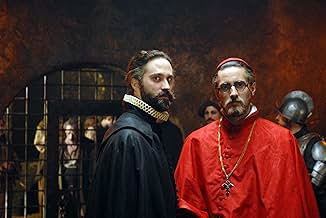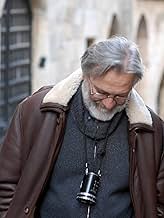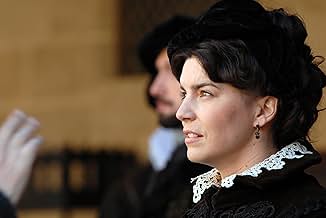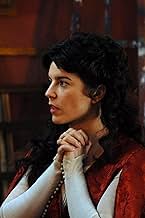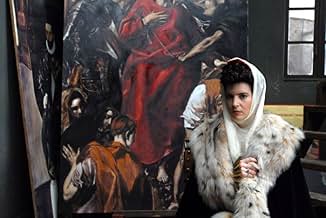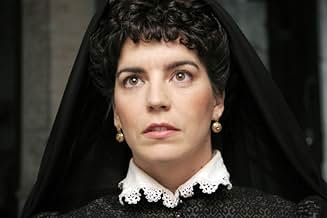Ajouter une intrigue dans votre langueThe story of the uncompromising artist and fighter for freedom, Domenicos Theotokopoulos, known to the world as "El Greco".The story of the uncompromising artist and fighter for freedom, Domenicos Theotokopoulos, known to the world as "El Greco".The story of the uncompromising artist and fighter for freedom, Domenicos Theotokopoulos, known to the world as "El Greco".
- Prix
- 12 victoires et 2 nominations
- El Greco
- (as Nick Ashdon)
- Duke Da Rimi
- (as Yorgos Christodoulou)
- Don Miguel de las Cuevas
- (as Fermi Reixac)
- Manousos
- (as Theo Zoumpoulidis)
- Titian's Assistant
- (as Yorgos Karamichos)
- Auctioneer
- (as Renos Charalampidis)
- Greco's Father
- (as Yorgos Charalampidis)
- Older Inquisitor
- (as Ricard Borras)
Histoire
Le saviez-vous
- AnecdotesThe last acting performance by Sotiris Moustakas.
- GaffesJust after the battle, the wound on El Greco father's forehead changes places between shots, from left forehead to just over his eyebrow.
- Citations
El Greco: You once reached out for God, and your fingers closed on emptiness ; and you didn't learn. How can God speak to you when instead of loving you burn, ruin and spread hatred all around?
El Greco: Now, of course, my turn has come - but you can't burn me... and I'll tell you why :
El Greco: Because I've been burning all my life, my entire life ; not in the fire, in the light. I threw myself into the blaze of it.
El Greco: You light fires because you're afraid to burn. You are afraid of the light and this is why I pity you, my old friend, Niño de Guevara.
El Greco: Because you aren't wrong to be afraid, but every flame you light drives you deeper into the darkness and no matter how many people you burn, you will never escape it.
El Greco: Can the darkness condemn the light?
- Bandes originalesTa dakrya einai dyo logio
Performed by Loudovikos ton Anogeion
How small it seems now. You can see loftier production values on TV, and probably much better acting and a less grating parade of profundities.
What really offends though is the spirit behind the work. It's not that it is dull and completely without insight about its own craft. It is both these things, but that's a simple incompetence. I mean, here is a film about a man of extraordinary vision who wanted to paint with light, and the 'inspirational' film about him is wholly ordinary, as lush and spiritual as perfume. What poor use of Aris Stavrou, who once liked to puzzle (next to Nikos Nikolaidis) about texture and light.
It's that Smaragdis hoped to capture a bit of Greek soul (not necessarily historical 'truth') and journey with it abroad, a noble aim. Capture us as we dream ourselves to be, feisty and passionate Zorbas, made pensive by centuries of hardship - a bit like Kusturica did for the neighboring Yugoslavs.
The film is set in those centuries of foreign rule, Italian and Ottoman elsewhere. There was no Rennaisance allowed in those times, it would be good to note, no lofty national art as they could develop in the salons of Western Europe. Our painting was religious. Our theater was song and dance, from Thrace to Crete. The collective soul had to pour that way, which is why they still persist and resonate so strongly in these parts - as elsewhere in the former empire.
You will know it's all phony by watching the scene of proud Cretans dancing after a skirmish with the Italians. You'd think, if there was a bit of ancient Greek song rising from the earth, it would be in that scene. If you are ever in the region, go to a Cretan wedding or folk fest, in fact anywhere in rural Greece during times of celebration. Then watch the posturing in the film. Dismal.
If you want to know a bit about these things, to see actual Balkan spirit, seek out a man called Sergei Parajanov. He was Armenian who made films under Soviet rule, but it is the same soul he captured.
- chaos-rampant
- 18 oct. 2012
- Lien permanent
Meilleurs choix
- How long is El Greco?Propulsé par Alexa
Détails
- Date de sortie
- Pays d’origine
- Langues
- Aussi connu sous le nom de
- El Greco - El último desafío a Dios
- Lieux de tournage
- Rhodes, Grèce(Castle of the Grand Master)
- sociétés de production
- Consultez plus de crédits d'entreprise sur IMDbPro
Box-office
- Brut – à l'échelle mondiale
- 9 620 040 $ US
- Durée1 heure 59 minutes
- Couleur
- Mixage
- Rapport de forme
- 1.78 : 1
Contribuer à cette page


